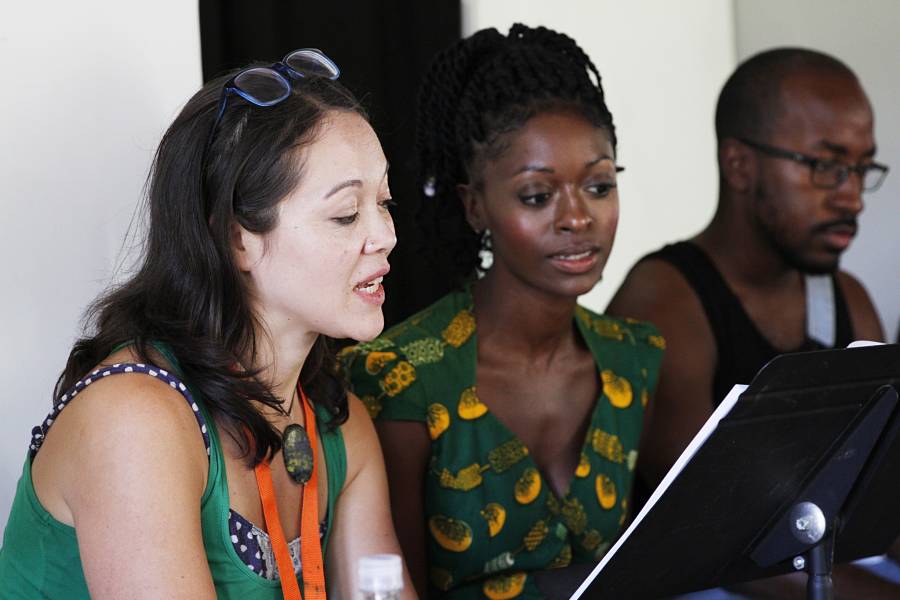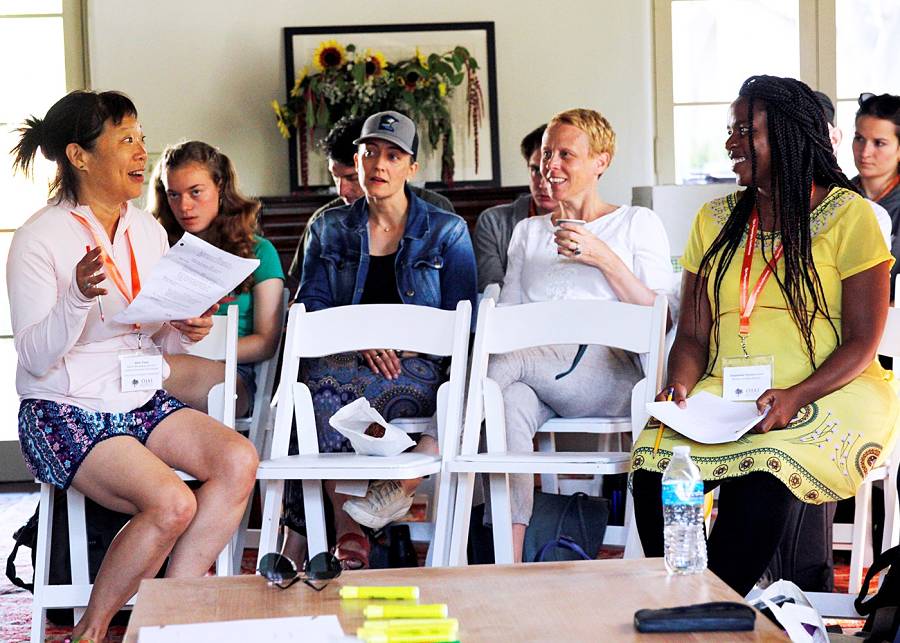Ojai is famous for a world-class music festival that convenes each June, but this idyllic Ventura County town is also host to another summer festival. Each year since 1998, theatre folks from around the U.S. and the world have gathered for the two-week-long Ojai Playwrights Conference. The Ojai community opens its homes to writers, staff, dramaturgs, directors, and actors as they work on new plays, culminating in a public reading to show the fruits of their efforts. Shows that have been developed at OPC, which has been under the leadership of Robert Egan since 2002, include Fun Home by Lisa Kron and Jeanine Tesori, Jon Robin Baitz’s Other Desert Cities, Danai Gurira’s Eclipsed, and Stephen Adly Guirgis’s The Motherfucker With the Hat.
Present at this year’s gathering (Aug. 4-11) were Alice Tuan, OPC’s artistic associate and intern workshop director, and Thandiwe Mawungwa, an award-winning playwright from Zimbabwe whose work has also been presented in Europe. The two first met at the Almasi African Playwrights Conference in Africa, where Mawungwa’s play 33 Cents was presented; the play was also developed at this year’s OPC.
The two met to debrief about the festival as it came to a close.
Alice Tuan: How were your travels to the Ojai Playwrights Conference?
Thandiwe Mawungwa: It took me 27 hours of flying and an additional 2 hours of road travel to get to Ojai. The hardest part of my journey was the six-hour flight from New York to Los Angeles. I could handle the 15-hour flight from Johannesburg to New York, because it was moving from one continent to the other, but I was totally unprepared for the six-hour flight from New York to Los Angeles (I guess I should have paid more attention to my flight itinerary!).
We’ve talked of many things here and in Zimbabwe, but I don’t think I’ve asked how you became a playwright?
Tuan: I remember the day: I was 17, growing up in the San Fernando Valley and doing what every teenager loves to do: sleep in! Suddenly I’m awakened by piercing beeps, which turn out to be my 98-year-old Chinese grandfather hunched over the microwave, trying to warm his tea but unable to find the start button. I tried to tell him that he needed to press the start button—
“HAH?!” (hard of hearing)
“Not 98 minutes. Too long?” I say.
“HAH?! Is it broken?”
“No, but to start you need to press this button.”
“HAH?!”…and on and on—and so that was the exchange I put down in words.
How did it start for you, how did you become a playwright?
Mawungwa: I’ve been writing since I was young. I wrote poetry and a first novel in Form Two (that’s grade nine in the United States). But I lost the novel. I wrote it using pen and paper. Yes, it was about teenage stuff—like that.
But what made me want to go into playwriting was one day, I watched a really terrible play—it was horrific, it was bad—and I thought to myself, why don’t I write something? So I wrote a play, A Banquet of Sorts, and that was the beginning. I was reading the Bible and was fascinated by the different kings with their different personalities, weaknesses, and strengths, and I wondered, what would happen if these kings came together to have dinner—what would that look like? Would they try to trump each other with their stories?
I graduated top of class in computer science, got a job, and then quit. I wanted to write. After this decision, I spent seven years of my life broke, but I never regretted my decision.
How did you come to facilitate the African Playwrights Conference in Zimbabwe?
Tuan: Playwright/actor Danai Gurira co-founded the Almasi African Playwrights Conference in 2015 after developing her acclaimed play In the Continuum at OPC. Robert Egan went to the first conference in 2015, but wasn’t able to go again in 2018 and asked if I would facilitate, since I was familiar with the OPC play development model, where in the first part, playwrights get deep dramaturgical feedback, and in the second part, actors rehearse the plays toward a public presentation.
What inspired you to write 33 Cents, the play you’ve brought to OPC?
Mawungwa: A few years ago my father got sick and we were told that his medical aid (called health insurance in the United States) would only cover part of the surgery that he needed. So we had to look for money and pay the additional amount or he would be sent home. We found the money and paid for the surgery. When we got home we heard on the news that the top executives of that medical aid had been looting people’s premiums and paying each other salaries of up to a quarter of a million dollars a month. I was so upset and went into my room to write the first draft of 33 Cents. I developed the play over five years before finally bringing it to the African Playwrights Conference.

Tuan: What has it been like working at Ojai, engaging with so many other writers?
Mawungwa: I really enjoyed the atmosphere in the library, where the initial play readings take place, among other writers and staff, the discussions, the feedback—everyone sounds educated. The in-depth analysis of the plays—it wasn’t surface, people go deep into the play and analyze it from a deep perspective. And just how people were invested in each play, not just commenting because they have to, but invested in each play that is being shared by their fellow OPC playwrights.
And then everyone continues discussing the plays, at meals, in passing—it shows that there was a deep caring of the craft.
Tuan: Do you find general conversation to be different here? When I’m at Almasi in Zimbabwe, we talk about a lot about political issues.
Mawungwa: In a way they are similar. The citizens here are discontented with their current administration, and so are the citizens back home. However I notice there is a lot of discussion around personal identity here in the United States—conversations we never really have back home. We sort of just take our identity for granted. We’re dealing with different issues: the basics, getting food on the table, getting water and electricity.
Tuan: What’s next for you after Ojai?
Mawungwa: With regards to the play I brought here, 33 Cents, I am going to incorporate the helpful comments and insights I received during the library sessions into another draft. Hopefully, with the connections I have made here, I am going to get a few more readings before looking into getting a full production of the play either in Zimbabwe or here in the United States. Whilst here, I have been inspired to write a musical, so I will also be working on that as well.
And then of course, there is the wonderful bundle of joy that I am expecting in October. So, with the plays and the baby, it looks like I have my work cut out for me for a couple of months.


